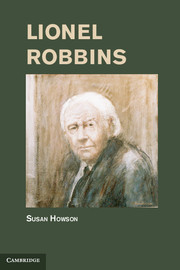Book contents
- Frontmatter
- Contents
- Illustrations
- Abbreviations
- Introduction
- One Father and Son
- Two The Great War
- Three Postwar
- Four The London School of Economics
- Five Iris Gardiner
- Six New College Oxford
- Seven The Young Professor
- Eight Fritz and Lionel
- Nine The School in the Mid-1930s
- Ten The Approach of War
- Eleven The Economics of War
- Twelve Director of the Economic Section
- Thirteen Anglo-American Conversations
- Fourteen The Law Mission and the Steering Committee
- Fifteen 1 9 4 4
- Sixteen The Last Months of the War
- Seventeen The Postwar Settlement
- Eighteen Return to the School
- Nineteen The End of the Transition
- Twenty LSE in the Early 1950s
- Twenty-One Chairman of the National Gallery
- Twenty-two Lord Robbins
- Twenty-three The Robbins Report
- Twenty-four The Sixties
- Twenty-five The Arts
- Twenty-six The Troubles at LSE
- Twenty-seven Retirement
- Conclusion
- Bibliography
- Index
Six - New College Oxford
Published online by Cambridge University Press: 07 October 2011
- Frontmatter
- Contents
- Illustrations
- Abbreviations
- Introduction
- One Father and Son
- Two The Great War
- Three Postwar
- Four The London School of Economics
- Five Iris Gardiner
- Six New College Oxford
- Seven The Young Professor
- Eight Fritz and Lionel
- Nine The School in the Mid-1930s
- Ten The Approach of War
- Eleven The Economics of War
- Twelve Director of the Economic Section
- Thirteen Anglo-American Conversations
- Fourteen The Law Mission and the Steering Committee
- Fifteen 1 9 4 4
- Sixteen The Last Months of the War
- Seventeen The Postwar Settlement
- Eighteen Return to the School
- Nineteen The End of the Transition
- Twenty LSE in the Early 1950s
- Twenty-One Chairman of the National Gallery
- Twenty-two Lord Robbins
- Twenty-three The Robbins Report
- Twenty-four The Sixties
- Twenty-five The Arts
- Twenty-six The Troubles at LSE
- Twenty-seven Retirement
- Conclusion
- Bibliography
- Index
Summary
New College Oxford was founded in 1379 by William of Wykeham, Bishop of Winchester, who also founded the most academic of English public schools, Winchester College, in 1382. ‘They were founded, as the statutes of New College say, to counter “the fewness of clergy, arising from pestilence, wars and other miseries”, and so their object was to convert “poor and indigent scholars” into “men of great learning, fruitful to the church, the king and the realm” – that is secular clergy to be suited for administrative posts.’ The brightest and the best of the Wykehamists usually went up to New College. The core of the college – hall, chapel, library and sets ranged around the Great Quad – was built in 1380–1404. Its garden, with an artificial mound made in 1594, is surrounded on two sides by the old city walls (Sherwood and Pevsner 1974, 166–74). Lionel Robbins told his father on 16 October 1924 that it must be ‘the most beautiful of all the colleges [for] I cannot conceive anything surpassing the beauty of the garden’.
The Oxford Michaelmas term began on Sunday 12 October 1924. Lionel arrived at New College the previous Thursday in order to spend the weekend in college before meeting his students. ‘It was a damp, windy autumn evening, the quad was gloomy and empty and my spirits were at their most diffident and apprehensive.’ He was met by Alic Smith, Fellow and Tutor in Philosophy: ‘in a dozen paces, as he gripped my bag and welcomed me, he made me feel a full member of the college.’ They became lasting friends. Smith was not an outstanding philosopher and had been a civil servant before he became a fellow of New College, but Lionel greatly admired him as ‘a practical idealist, decisive, open-minded, forward-looking, and immensely influential in the councils of the college’. He was devoted to the arts as well as to the college, of which he was later Warden (Bowra 1966, 107–8; Robbins 1971a, 115–16). The senior tutor, H.W.B. Joseph, whom Lionel had met in July, was a much more distinguished philosopher but also a dedicated teacher. In 1924 the Warden was the Reverend William Archibald Spooner, famous for his lapses of speech known as ‘Spoonerisms’. The historian H.A.L. Fisher, who had been President of the Board of Education in the Lloyd George coalition government, was elected Warden in January 1925.
- Type
- Chapter
- Information
- Lionel Robbins , pp. 126 - 165Publisher: Cambridge University PressPrint publication year: 2011

